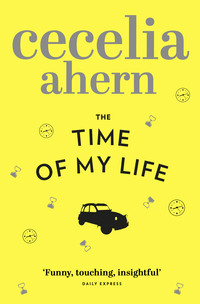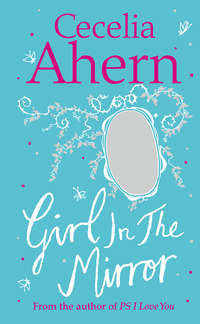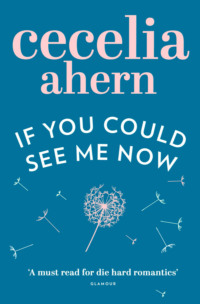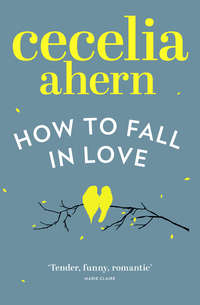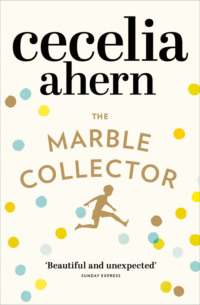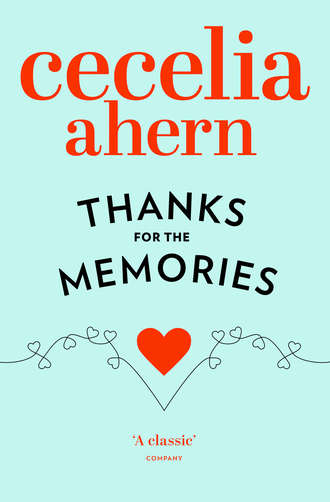
Полная версия
Thanks for the Memories
‘Singapore, Dad,’ I smile.
‘That’s it.’ He raises his eyebrows. ‘You met her already, did you? They all speak English, though, the foreigners do. Sure, isn’t that better than being on your holidays and having to do all that signed-languagey stuff.’ He puts his cap down on the bed and wiggles his fingers around.
‘Dad,’ I smile, ‘you’ve never been out of the country in your life.’
‘Haven’t I heard the lads at the Monday Club talking about it? Frank was away in that place last week – oh, what’s that place?’ He shuts his eyes and thinks hard. ‘The place where they make the chocolates?’
‘Switzerland.’
‘No.’
‘Belgium.’
‘No,’ he says, frustrated now. ‘The little round ball-y things all crunchy inside. You can get the white ones now but I prefer the original dark ones.’
‘Maltesers?’ I laugh, but feel pain and stop.
‘That’s it. He was in Maltesers.’
‘Dad, it’s Malta.’
‘That’s it. He was in Malta.’ He is silent. ‘Do they make Maltesers?’
‘I don’t know. Maybe. So what happened to Frank in Malta?’
He squeezes his eyes shut again and thinks. ‘I can’t remember what I was about to say now.’
Silence. He hates not being able to remember. He used to remember everything.
‘Did you make any money on the horses?’ I ask.
‘A few bob. Enough for a few rounds at the Monday Club tonight.’
‘But today is Tuesday.’
‘It’s on a Tuesday on account of the bank holiday,’ he explains, seesawing around to the other side of the bed to sit down.
I can’t laugh. I’m too sore and it seems some of my sense of humour was taken away with my child.
‘You don’t mind if I go, do you, Joyce? I’ll stay if you want, I really don’t mind, it’s not important.’
‘Of course it’s important. You haven’t missed a Monday night for twenty years.’
‘Apart from bank holidays!’ He lifts a crooked finger and his eyes dance.
‘Apart from bank holidays,’ I smile, and grab his finger.
‘Well,’ he takes my hand, ‘you’re more important than a few pints and a singsong.’
‘What would I do without you?’ My eyes fill again.
‘You’d be just fine, love. Besides …’ he looks at me warily, ‘you have Conor.’
I let go of his hand and look away. What if I don’t want Conor any more?
‘I tried to call him last night on the hand phone but there was no answer. But maybe I tried the numbers wrong,’ he adds quickly. ‘There are so many more numbers on the hand phones.’
‘Mobiles, Dad,’ I say distractedly.
‘Ah, yes. The mobiles. He keeps calling when you’re asleep. He’s going to come home as soon as he can get a flight. He’s very worried.’
‘That’s nice of him. Then we can get down to the business of spening the next ten years of our married life trying to have babies.’ Back to business. A nice little distraction to give our relationship some sort of meaning.
‘Ah now, love …’
The first day of the rest of my life and I’m not sure I want to be here. I know I should be thanking somebody for this but I really don’t feel like it. Instead I wish they hadn’t bothered.
SIX
I watch the three children playing together on the floor of the hospital, little fingers and toes, chubby cheeks and plump lips – the faces of their parents clearly etched on theirs. My heart drops into my stomach and it twists. My eyes fill again and I have to look away.
‘Mind if I have a grape?’ Dad chirps. He’s like a little canary swinging in a cage beside me.
‘Of course you can. Dad, you should go home now, go get something to eat. You need your energy.’
He picks up a banana. ‘Potassium,’ he smiles, and moves his arms rigorously. ‘I’ll be jogging home tonight.’
‘How did you get here?’ It suddenly occurs to me that he hasn’t been into the city for years. It all became too fast for him, buildings suddenly sprouting up where there weren’t any, roads with traffic going in different directions from before. With great sadness he sold his car too, his failing eyesight too much of a danger for him and others on the roads. Seventy-five years old, his wife dead ten years. Now he has a routine of his own, content to stay around the local area, chatting to his neighbours, church every Sunday and Wednesday, Monday Club every Monday (apart from the bank holidays when it’s on a Tuesday), butchers on a Tuesday, his crosswords, puzzles and TV shows during the days, his garden all the moments in between.
‘Fran from next door drove me in.’ He puts the banana down, still laughing to himself about his jogging joke, and pops another grape into his mouth. ‘Almost had me killed two or three times. Enough to let me know there is a God if ever there was a time I doubted. I asked for seedless grapes; these aren’t seedless,’ he frowns. Liver-spotted hands put the bunch back on the side cabinet. He takes seeds out of his mouth and looks around for a bin.
‘Do you still believe in your God now, Dad?’ It comes out crueller than I mean to but the anger is almost unbearable.
‘I do believe, Joyce.’ As always, no offence taken. He puts the pips in his handkerchief and places it back in his pocket. ‘The Lord acts in mysterious ways, in ways we often can neither explain nor understand, tolerate nor bear. I understand how you can question Him now – we all do at times. When your mother died I …’ he trails off and abandons the sentence as always, the furthest he will go to being disloyal about his God, the furthest he will go to discussing the loss of his wife. ‘But this time God answered all my prayers. He sat up and heard me calling last night. He said to me,’ Dad puts on a broad Cavan accent, the accent he had as a child before moving to Dublin in his teens, ‘“No problem, Henry. I hear you loud and clear. It’s all in hand so don’t you be worrying. I’ll do this for you, no bother at all.” He saved you. He kept my girl alive and for that I’ll be forever grateful to Him, sad as we may be about the passing of another.’
I have no response to that, but I soften.
He pulls his chair closer to my bedside and it screeches along the floor.
‘And I believe in an afterlife,’ he says a little quieter now. ‘That I do. I believe in the paradise of heaven, up there in the clouds, and everyone that was once here is up there. Including the sinners, for God’s a forgiver, that I believe.’
‘Everyone?’ I fight the tears. I fight them from falling. If I start I know I will never stop. ‘What about my baby, Dad? Is my baby there?’
He looks pained. We hadn’t spoken much about my pregnancy. Early days and we were all worried, nobody more than he. Only days ago we’d had a minor falling-out over my asking him to store our spare bed in his garage. I had started to prepare the nursery, you see … Oh dear, the nursery. The spare bed and junk just cleared out. The cot already purchased. Pretty yellow on the walls. ‘Buttercup Dream’ with a little duckie border.
Five months to go. Some people, my father included, would think preparing the nursery at four months is premature but we’d been waiting six years for a baby, for this baby. Nothing premature about that.
‘Ah, love, you know I don’t know …’
‘I was going to call him Sean if it was a boy,’ I hear myself finally say aloud. I have been saying these things in my head all day, over and over, and here they are, spilling out of me instead of the tears.
‘Ah, that’s a nice name. Sean.’
‘Grace, if it was a girl. After Mum. She would have liked that.’
His jaw sets at this and he looks away. Anyone who doesn’t know him would think this has angered him. I know this is not the case. I know it’s the emotion gathering in his jaw, like a giant reservoir, storing and locking it all away until absolutely necessary, waiting for those rare moments when the drought within him calls for those walls to break and for the emotions to gush.
‘But for some reason I thought it was a boy. I don’t know why but I just felt it somehow. I could have been wrong. I was going to call him Sean,’ I repeat.
Dad nods. ‘That’s right. A fine name.’
‘I used to talk to him. Sing to him. I wonder if he heard.’ My voice is far away. I feel like I’m calling out from the hollow of a tree, where I hide.
Silence while I imagine a future that will never be with little imaginary Sean. Of singing to him every night, of marshmallow skin and splashes at bath time. Of kicking legs and bicycle rides. Of sandcastle architecture and football-related hot-headed tantrums. Anger at a missed life – no, worse – a lost life, overrides my thoughts.
‘I wonder if he even knew.’
‘Knew what, love?’
‘What was happening. What he would be missing. Did he think I was sending him away? I hope he doesn’t blame me. I was all he had and—’ I stop. Torture over for now. I feel seconds away from screaming with such terror, I must stop. If I start my tears now I know I will never stop.
‘Where is he now, Dad? How can you even die when you haven’t even been born yet?’
‘Ah, love.’ He takes my hand and squeezes it again.
‘Tell me.’
This time he thinks about it. Long and hard. He pats my hair, with steady fingers takes the strands from my face and tucks them behind my ears. He hasn’t done that since I was a little girl.
‘I think he’s in heaven, love. Oh, there’s no thinking involved – I know so. He’s up there with your mother, yes he is. Sitting on her lap while she plays rummy with Pauline, robbing her blind and cackling away. She’s up there all right.’ He looks up and wags his forefinger at the ceiling. ‘Now you take care of baby Sean for us, Gracie, you hear? She’ll be tellin’ him all about you, she will, about when you were a baby, about the day you took your first steps, about the day you got your first tooth. She’ll tell him about your first day of school and your last day of school and every day in between, and he’ll know all about you so that when you walk through those gates up there, as an old woman far older than me now, he’ll look up from rummy and say, “Ah, there she is now. The woman herself. My mammy.” Straight away he’ll know.’
The lump in my throat, so huge I can barely swallow, prevents me from saying the thank you I want to express, but perhaps he sees it in my eyes as he nods in acknowledgement and then turns his attention back to the TV while I stare out the window at nothing.
‘There’s a nice chapel here, love. Maybe you should go visit, when you’re good and ready. You don’t even have to say anything, He won’t mind. Just sit there and think. I find it helpful.’
I think it’s the last place in the world I want to be.
‘It’s a nice place to be,’ Dad says, reading my mind. He watches me and I can almost hear him praying for me to leap out of bed and grab the rosary beads he’s placed by the bedside.
‘It’s a rococo building, you know,’ I say suddenly, and have no idea what I’m talking about.
‘What is?’ Dad’s eyebrows furrow and his eyes disappear underneath, like two snails disappearing into their shells. ‘This hospital?’
I think hard. ‘What were we talking about?’
Then he thinks hard. ‘Maltesers. No!’
He’s silent for a moment, then starts answering as though in a quick-fire round of a quiz.
‘Bananas! No. Heaven! No. The chapel! We were talking about the chapel.’ He flashes a million-dollar smile, jubilant he succeeded in remembering the conversation of less than one minute ago. He goes further now. ‘And then you said it’s a rickety building. But honestly it felt fine to me. A bit old but, sure, there’s nothin’ wrong with being old and rickety.’ He winks at me.
‘The chapel is a rococo building, not rickety,’ I correct him, feeling like a teacher. ‘It’s famous for the elaborate stucco work which adorns the ceiling. It’s the work of French stuccadore, Barthelemy Cramillion.’
‘Is that so, love? When did he do that, then?’ He moves his chair in closer to the bed. Loves nothing more than a scéal.
‘In 1762.’ So precise. So random. So natural. So inexplicable that I know it.
‘That long? I didn’t know the hospital was here since then.’
‘It’s been here since 1757,’ I reply, and then frown. How on earth do I know that? But I can’t stop myself, almost like my mouth is on autopilot, completely unattached to my brain. ‘It was designed by the same man who did Leinster House. Richard Cassells was his name. One of the most famous architects of the time.’
‘I’ve heard of him, all right,’ Dad lies. ‘If you’d said Dick I’d have known straight away.’ He chuckles.
‘It was Bartholomew Mosse’s brainchild,’ I explain and I don’t know where the words are coming from, don’t know where the knowledge is coming from. From where else, I don’t know. Like a feeling of déjà vu – these words, this feeling is familiar but I haven’t heard them or spoken them in this hospital. I think maybe I’m making it up but I know somewhere deep inside that I’m correct. A warm feeling floods my body.
‘In 1745 he purchased a small theatre called the New Booth and he converted it into Dublin’s first lying-in hospital.’
‘It stood here, did it? The theatre?’
‘No, it was on George’s Lane. This was all just fields. But eventually that became too small and he bought the fields that were here, consulted with Richard Cassells and in 1757 the new lying-in hospital, now known as the Rotunda, was opened by the Lord Lieutenant. On the eighth of December, if I recall correctly.’
Dad is confused. ‘I didn’t know you had an interest in that kind of thing, Joyce. How do you know all that?’
I frown. I didn’t know I knew that either. Suddenly frustration overwhelms me and I shake my head aggressively.
‘I want a haircut,’ I add angrily, blowing my fringe off my forehead. ‘I want to get out of here.’
‘OK, love.’ Dad’s voice is quiet. ‘A little longer, is all.’
SEVEN
Get a haircut! Justin blows his fringe out of his eyes and glares with dissatisfaction at his reflection in the mirror.
Until his image caught his eye, he was packing his bag to go back to London while whistling the happy tune of a recently divorced man who’d just been laid by the first woman since his wife. Well, the second time that year, but the first that he could recall with some small degree of pride. Now, standing before the full-length mirror, his whistling stalls, the image of his Fabio self failing miserably against the reality. He corrects his posture, sucks in his cheeks and flexes his muscles, vowing that now that the divorce cloud has lifted, he will get his body back in order. Forty-three years old, he is handsome and he knows it, but it’s not a view that is held with arrogance. His opinions on his looks are merely understood with the same logic he applies to tasting a fine wine. The grape was merely grown in the right place, under the right conditions. Some degree of nurturing and love mixed with later moments of being completely trampled on and walked all over. He possesses the common sense enabling him to recognise he was born with good genes and features that were in proportion, in the right places. He should be neither praised nor blamed for this just as a less attractive person should not be viewed with flared nostrils and a media-obsessed induced smirk. It’s just how it is.
At almost six feet, he is tall, his shoulders broad, his hair still thick and chestnut brown, though greying at the sides. This he does not mind, he’s had grey hairs since his twenties and has always felt they give him a distinguished look. Though there were some, afraid of the very nature of life, that viewed his salt-and-pepper sideburns as a thorn that would burst the bubble of their pretend life every time he was in their presence. They would come at him, bowing over and hunchbacked, and taking on the appearance of a sixteenth-century black-toothed tramp, thrusting hair dye at him as though it were a carafe of precious water from the fountain of eternal life.
For Justin, moving on and change are what he expects. He is not one for pausing, for becoming stuck in life, though he didn’t expect his particular philosophy of ageing and greying to apply to his marriage. Jennifer left him two years ago to ponder this, though not just this, but for a great many other reasons too. So many, in fact, he wishes he had taken out a pen and notepad and listed them as she bellowed at him in her tirade of hate. In the initial dark lonely nights that followed, Justin held the bottle of dye in his hand and wondered if he gave in to his solid tight philosophy, would he make things all right? Would he wake up in the morning and Jennifer be in their bed; would the light scar on his chin have healed from where the wedding ring had landed; would the list of things about him she hated so much be the very things she loved? He sobered up then and emptied the dye down his rented accommodation kitchen sink, blackened stainless steel that proved a reminder to him everyday of his decision to stay rooted in reality, until he moved to London to be closer to his daughter, much to his ex-wife’s disgust.
Through strands of his long fringe hanging over his eyes, he has a vision of the man he expects to see. Leaner, younger, perhaps with fewer wrinkles around the eyes. Any faults, such as the expanding waistline, are partly due to age and partly of his own doing, because he took to beer and takeaways for comfort during his divorce process rather than walking or the occasional jog.
Repeated flashbacks of the previous night draw his eyes back to the bed, where he and Sarah finally got to know one another intimately. All day he definitely felt like the big man on campus and he was just seconds away from interrupting his talk on Dutch and Flemish painting to give details of his previous night’s performance. First-year students in the midst of Rag Week, only three-quarters of the class had shown up after the previous night’s foam party and those that were in attendance he was sure wouldn’t notice if he launched into a detailed analysis of his lovemaking skills. He didn’t test his assumptions, all the same.
Blood For Life Week is over, much to Justin’s relief, and Sarah has moved on from the college, back to her base. On his return to Dublin this month he coincidentally bumped into her in a bar, that he just happened to know she frequented, and they went from there. He wasn’t sure if he would see her again though his inside jacket pocket was safely padded with her number.
He has to admit that while the previous night was indeed delightful – a few too many bottles of Château Olivier, which, until last night he’s always found disappointing despite its ideal location in Bordeaux, in a lively bar on the Green, followed by a trip to his hotel room – he feels much was missing from his conquest. He acquired some Dutch courage from his hotel mini-bar before calling round to see her, and by the time he arrived, he was already incapable of serious conversation or, more seriously, incapable of conversation – Oh, for Christ’s sake, Justin, what man do you know cares about the damn conversation? But, despite ending up in his bed, he feels that Sarah did care about the conversation. He feels that perhaps there were things she wanted to say to him and perhaps did say while he saw those sad blue eyes boring into his and her rosebud lips opening and closing, but his Jameson whiskey wouldn’t allow him to hear, instead singing over her words in his head like a petulant child.
With his second seminar in two months complete, Justin throws his clothes into his bag, happy to see the back of his miserable musty room. Friday afternoon, time to fly back to London. Back to his daughter, and his younger brother, Al, and sister-in-law, Doris, visiting from Chicago. He departs the hotel, steps out onto the cobbled side streets of Temple Bar and into his waiting taxi.
‘The airport, please.’
‘Here on holidays?’ the driver asks immediately.
‘No.’ Justin looks out the window, hoping this will end the conversation.
‘Working?’ The driver starts the engine.
‘Yes.’
‘Where do you work?’
‘A college.’
‘Which one?’
Justin sighs. ‘Trinity.’
‘You the janitor?’ Those green eyes twinkle playfully at him in the mirror.
‘I’m a lecturer on Art and Architecture,’ he says defensively, folding his arms and blowing his floppy fringe from his eyes.
‘Architecture, huh? I used to be a builder.’
Justin doesn’t respond and hopes the conversation will end there.
‘So where are ye off to? Off on holiday?’
‘Nope.’
‘What is it then?
‘I live in London.’ And my US social security number is …
‘And you work here?’
‘Yep.’
‘Would you not just live here?’
‘Nope.’
‘Why’s that then?’
‘Because I’m a guest lecturer here. A previous colleague of mine invited me to give a seminar once a month.’
‘Ah.’ The driver smiles at him in the mirror as though he’d been trying to fool him. ‘So what do you do in London?’ His eyes interrogate him.
I’m a serial killer who preys on inquisitive cab drivers.
‘Lots of different things.’ Justin sighs and caves in as the driver waits for more. ‘I’m the editor of the Art and Architectural Review, the only truly international art and architectural publication,’ he says proudly. ‘I started it ten years ago and still we’re unrivalled. Highest selling magazine of its kind.’ Twenty thousand subscribers, you liar.
There’s no reaction.
‘I’m also a curator.’
The driver winces. ‘You’ve to touch dead bodies?’
Justin scrunches his face in confusion. ‘What? No.’ Then adds unnecessarily, ‘I’m also a regular panelist on a BBC art and culture show.’
Twice in five years doesn’t quite constitute regular, Justin. Oh, shut up.
The driver studies Justin now, in the rearview mirror. ‘You’re on TV?’ He narrows his eyes. ‘I don’t recognise you.’
‘Well, do you watch the show?’
‘No.’
Well, then.
Justin rolls his eyes. He throws off his suit jacket, opens another of his shirt buttons and lowers the window. His hair sticks to his forehead. Still. A few weeks have gone by and he still hasn’t been to the barber. He blows his fringe out of his eyes.
They stop at a red light and Justin looks to his left. A hair salon.
‘Hey, would you mind pulling over on the left just for a few minutes?’
‘Look, Conor, don’t worry about it. Stop apologising,’ I say into the phone tiredly. He exhausts me. Every little word with him drains me. ‘Dad is here with me now and we’re going to get a taxi to the house together, even though I’m perfectly capable of sitting in a car by myself.’
Outside the hospital, Dad holds the door open for me and I climb into the taxi. Finally I’m going home but I don’t feel the relief I was hoping for. There’s nothing but dread. I dread meeting people I know and having to explain what has happened, over and over again. I dread walking into my house and having to face the half-decorated nursery. I dread having to get rid of the nursery, having to replace it with a spare bed and filling the wardrobes with my own overflow of shoes and bags I’ll never wear. As though a bedroom for them alone is as good a replacement as a child. I dread having to go to work instead of taking the leave I had planned. I dread seeing Conor. I dread going back to a loveless marriage with no baby to distract us. I dread living every day of the rest of my life while Conor drones on and on down the phone about wanting to be here for me, when it seems my telling him not to come home has been my mantra for the past few days. I know it would be common sense for me to want my husband to come rushing home to me – in fact, for my husband to want to come rushing home to me – but there are many buts in our marriage and this incident is not a regular normal occurrence. It deserves outlandish behaviour. To behave the right way, to do the adult thing feels wrong to me because I don’t want anybody around me. I’ve been poked and prodded psychologically and physically. I want to be on my own to grieve. I want to feel sorry for myself without sympathetic words and clinical explanations. I want to be illogical, self-pitying, self-examining, bitter and lost for just a few more days, please, world, and I want to do it alone.


